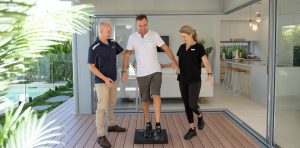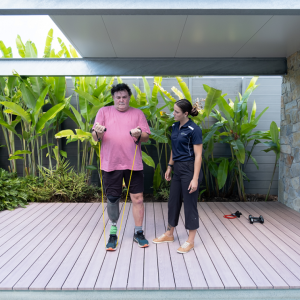Unlocking the Benefits of Mobile Physiotherapy

In the vast landscape of Australian healthcare, a transformative shift is underway — a shift that brings essential services to the heart of our homes. As the demand for accessible and personalised healthcare continues to soar, the emergence of mobile healthcare services has become a beacon of convenience and tailored care. In this era where time is a precious commodity, the spotlight is now on services that not only meet but exceed expectations.
Among these innovative healthcare solutions, mobile physiotherapy stands tall, offering a bridge between expert care and the comfort of one’s own living space. In this exploration, we delve into the rise of mobile healthcare services within the Australian context, steering our focus towards the pivotal realm of mobile physiotherapy.
As we navigate this landscape, the importance of bringing physiotherapy to the doorstep becomes increasingly apparent, aligning seamlessly with the evolving healthcare needs of Australians. Join us on this journey as we unlock the benefits and significance of choosing mobile physiotherapy services, a transformative approach that reflects the changing tides of healthcare accessibility in Australia.
Convenience at Your Doorstep
In the realm of Australian healthcare, mobile physiotherapy stands as a symbol of unparalleled convenience. This innovative approach brings expert care directly to the homes of patients, reshaping the traditional healthcare experience.
The inherent time-saving aspect is a crucial advantage, eliminating the need for cumbersome travel and alleviating the stress associated with reaching a clinic. By choosing mobile physiotherapy, individuals can embark on their journey to recovery right from the comfort of their own homes, prioritising health without compromising convenience.
Personalised Care in Familiar Surroundings

Mobile physiotherapy transcends the conventional healthcare model by offering a personalised and tailored approach that resonates deeply with Australians seeking individualised care. Within the familiar confines of one’s home, patients experience a level of comfort and intimacy that goes beyond the clinical setting.
The essence of personalised care in mobile physiotherapy lies in its adaptability to the unique needs of each individual. Therapists, equipped with a comprehensive understanding of the patient’s environment, can tailor rehabilitation plans to align seamlessly with their lifestyle. This bespoke approach not only enhances the effectiveness of physiotherapy but also fosters a sense of empowerment, as patients actively participate in their healing journey within the comfort of their own homes.
The home, often considered a sanctuary, becomes the backdrop for a holistic and personalised rehabilitation experience. This intersection of familiarity and tailored care sets mobile physiotherapy apart, providing a compassionate and patient-centric approach that acknowledges the importance of environment in the healing process.
Evidence-Based Effectiveness
In recent years, a growing body of research has consistently highlighted the effectiveness of at-home physiotherapy in the healthcare landscape. As we delve into the evidence-based landscape of mobile physiotherapy, let’s draw insights from a study published in the Journal of Physical Therapy Science,
“… Statistically significant improvement in the visual analog scale and Western Ontario and Mcmaster Universities Osteoarthritis Index scores were observed, with overall % improvement of 52% and 43%, respectively. The average scores in pain and disability were reduced after home based physiotherapy.”
These statistics emphasise not only the convenience of at-home sessions but also the tangible and quantifiable benefits that contribute to a more efficient and effective rehabilitation process.
Improved Adherence to Treatment Plans
The transition from clinic-based to at-home physiotherapy introduces a pivotal shift in the dynamics of patient engagement and commitment to treatment plans. The unparalleled convenience of home sessions acts as a catalyst for improved adherence, ultimately paving the way for more successful rehabilitation outcomes.
The ease of scheduling and the elimination of travel-related challenges empower individuals to seamlessly integrate therapy sessions into their daily routines.
The home, a space intertwined with personal routines and comfort, becomes the backdrop for consistent therapy. Patients find themselves in an environment where they feel most at ease, fostering a sense of continuity in their rehabilitation journey. This consistent engagement contributes to measurable progress over time.
The adaptability of at-home physiotherapy allows therapists to tailor treatment plans that align with the individual’s lifestyle. This bespoke approach not only enhances the relevance of interventions but also increases the likelihood of patients adhering to their prescribed exercises, promoting sustained progress.
The collaborative nature of at-home sessions empowers patients to actively participate in their recovery. As a result, a sense of ownership develops, leading to a higher commitment to the overall treatment plan. This patient-centric model marks a departure from traditional approaches, emphasising a partnership in achieving health goals.
In exploring the improved adherence facilitated by at-home physiotherapy, we uncover a transformative approach that not only simplifies the logistics of rehabilitation but also cultivates a commitment to health that extends far beyond the confines of a clinic.
Technological Advancements in Mobile Physiotherapy

The landscape of healthcare is continually evolving, and within the realm of mobile physiotherapy, technological advancements play a pivotal role in enhancing the overall patient experience. This section sheds light on the innovative tools and technologies employed in delivering at-home physiotherapy services and explores how these advancements contribute to better patient outcomes.
- Telehealth Platforms
The integration of telehealth platforms enables real-time video consultations between patients and physiotherapists. This virtual connection bridges the gap between sessions, allowing for continuous guidance, progress tracking, and instant feedback. Patients can seamlessly access their personalised treatment plans from the comfort of their homes. - Wearable Technology
Incorporating wearable devices into mobile physiotherapy brings a new dimension to patient engagement. Wearables, such as smart sensors and activity trackers, enable therapists to monitor movements remotely. This data-driven approach allows for a more precise evaluation of progress and ensures that interventions are tailored to the individual’s evolving needs. - Mobile Apps for Home Exercises
Interactive mobile applications empower patients to adhere to their prescribed exercises with ease. These apps often include instructional videos, progress tracking features, and reminders, turning smartphones into valuable tools for at-home rehabilitation. The accessibility of exercise guidance fosters a sense of independence and commitment among patients. - Virtual Reality (VR) Rehabilitation
The utilisation of virtual reality in physiotherapy introduces an immersive dimension to rehabilitation exercises. VR simulations engage patients in purposeful activities, making the therapy experience more enjoyable. This not only enhances motivation but also aids in the retraining of motor skills, contributing to more effective and targeted interventions. - Data Analytics for Personalisation
Advanced data analytics tools analyse patient data to inform personalised treatment plans. By considering individual progress, challenges, and preferences, physiotherapists can adapt interventions dynamically. This personalised approach maximises the efficiency of each session, leading to better patient outcomes over time.
In embracing these technological advancements, mobile physiotherapy goes beyond conventional approaches, offering a sophisticated and patient-centric experience that aligns seamlessly with the evolving landscape of healthcare in Australia. The fusion of innovation and care not only enhances the effectiveness of physiotherapy but also empowers patients to actively participate in their journey to recovery.
Addressing Common Concerns
In the realm of healthcare innovation, it’s natural for questions and concerns to arise, especially when considering a departure from traditional clinic-based physiotherapy. This section candidly addresses common concerns about the effectiveness of mobile physiotherapy, providing evidence-backed answers to offer clarity and reassurance.
- Concern: Is Mobile Physiotherapy as Effective as In-Clinic Sessions?
Response: Absolutely. Numerous studies, including research from the Australian Physiotherapy Association, have shown that mobile physiotherapy is not only comparable in effectiveness to in-clinic sessions but can often yield better results. The personalised nature of at-home care, combined with evolving technological tools, ensures a tailored and impactful rehabilitation experience. - Concern: Will I Receive Personalised Attention at Home?
Response: Yes. Mobile physiotherapy is designed for personalised care. Therapists tailor treatment plans to fit your unique needs, taking into account your living environment, lifestyle, and specific health goals. The one-on-one sessions ensure dedicated attention and a focus on your individual journey to recovery. - Concern: Can At-Home Physiotherapy Address Complex Conditions?
Response: Absolutely. Mobile physiotherapy is not limited by the complexity of conditions. Therapists are equipped to address a wide range of health concerns, and the adaptability of at-home sessions allows for a comprehensive and targeted approach to complex conditions. - Concern: How Can Technology Replace In-Person Interaction?
Response: Technology enhances rather than replaces in-person interaction. Telehealth platforms and wearable technologies facilitate real-time communication, progress tracking, and personalised guidance. These tools, when used in conjunction with in-person visits, create a holistic and interconnected approach to care. - Concern: Is At-Home Physiotherapy Safe?
Response: Yes. Safety is a top priority. Therapists conduct thorough assessments and adapt interventions to ensure a secure environment. Additionally, virtual consultations and continuous communication contribute to a proactive approach in managing your safety throughout the rehabilitation process.
By addressing these common concerns with evidence-backed responses, we aim to instill confidence in the effectiveness, safety, and personalised nature of mobile physiotherapy, empowering individuals to embrace this transformative approach to healthcare.
In essence, mobile physiotherapy emerges as a transformative solution, seamlessly weaving convenience, evidence-backed effectiveness, and patient-centric care into the fabric of healthcare. By bringing expert services directly to homes, this innovative approach not only eliminates travel-related stress but also fosters improved adherence to personalised treatment plans.
Technological advancements enhance engagement and outcomes, while addressed concerns affirm the safety and effectiveness of at-home sessions. In conclusion, consider mobile physiotherapy as a powerful ally in your health journey—where convenience meets effectiveness, and personalised care takes center stage, ensuring optimal well-being in the comfort of your own home.
